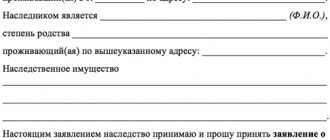Home / Family law / Inheritance
Back
Published: 08/08/2018
Reading time: 9 min
0
903
The procedure for entering into an inheritance after the death of the father can have two main options: if the father left a will for the apartment, or if there is no will. If there is a will, it is given priority, but even when there is no such document, the children have the first right to the father's property after his death.
- Who takes over the inheritance after the death of the father without a will first?
- How to receive an inheritance after the death of your father
- The procedure for accepting and registering an inheritance for an apartment without a will
- Documents for registration of inheritance for an apartment
- Features of inheriting property without a will
- Registration of inheritance through court proceedings
Who takes over the inheritance after the death of the father without a will first?
When the father has left a will, the inheritance procedure is extremely simple: the property is distributed among the persons specified in this document and in accordance with the wishes of the testator.
If there is no will, the inheritance procedure according to the rules of law comes into play. It involves the distribution of property in accordance with priority. Initially, all property is distributed among the heirs of the first stage, only then it passes to the second stage and beyond.
The first-order heirs include the deceased's wife, his children and parents. The entire inheritance mass is distributed between them in equal shares. For example, if there are 4 heirs left, then each gets ¼ of the property, if there are 2, then ½ each. If the father has no one left except his only child, then he inherits all his property.
Common-law wives do not receive rights to inherit without a will. Therefore, if the parents’ relationship has not been legalized, then the common child will inherit all the property.
Even if the parents were divorced at the time of death, the child is not deprived of his right to inheritance. He can also claim the property of the deceased as part of the first priority, when the father was deprived of parental rights during his lifetime.
This rule does not apply to children who were adopted during their lifetime, only to natural descendants. If the adoptive parent is deprived of parental rights, the children will not be able to receive an inheritance. In general, adopted children are entitled to all the same rights as full-born children.
If the father dies before he inherits certain property, the children become heirs according to the rules of transmission. They are enshrined in Art. 1156 of the Civil Code of the Russian Federation. For example, citizen R. bequeathed a share in a business to his father, but he did not have time to inherit because he died. Therefore, the specified share in the business will pass to the children of the testator as the primary successors by transmission.
Testamentary refusal
A will may contain a clause for heirs. For example, to prevent a son or daughter from ending up on the street soon, the testator can assign certain responsibilities to the heirs under the will (Article 1137 of the Civil Code of the Russian Federation).
Typically, owners provide for the right to use inherited housing or part of it. Therefore, if the heir takes over the property of the grandfather/grandmother, then he cannot kick out the legatee.
At a minimum, he must provide a room for the disinherited relative to stay. The period of use of the housing may be specified in the will itself.
Example. The grandmother lived in a civil marriage with a man. Older people no longer sought to legitimize their relationships. The woman's relationship with her only son did not work out. Therefore, she decided to sign over her apartment to her granddaughter. But so that the heiress would not kick out the grandmother’s live-in partner, she made a testamentary refusal. The granddaughter was given the obligation to provide the right to use the apartment for all the days of the elderly man’s life. 6 months later my grandmother died. Her granddaughter came into her own. She rented out part of the apartment to tenants. I gave one room to my grandmother’s roommate. A year later the man died. The heiress was freed from her obligations. After which she moved into an inherited apartment with her family.
If the provisions of the will are not fulfilled by the heir, the legatee may apply to the court with a corresponding claim.
Does a grandson have the right to refuse to accept an inheritance with a condition? Yes. Acceptance of the inheritance is not the responsibility of the applicants.
How to receive an inheritance after the death of your father
When registering an inheritance after the death of a father without a will, you must adhere to the following algorithm:
- Contact the notary at the father’s last place of residence with an application to accept the inheritance. This must be done within six months after the death of the testator. Here you need to clarify whether the father left a will. If not, then the child is the legal heir.
- Gather the necessary documents and request a property valuation report if necessary.
- Provide a set of documents to the notary confirming the rights to inheritance and the father’s ownership of certain property.
- Pay a state duty in the amount of 0.3% of the assessed value of the property , but not more than 100 thousand rubles.
- Receive a certificate of right to inheritance from a notary in six months.
- Re-register ownership of the testator's property in your favor.
You can also receive an inheritance if the heirs actually accepted the father’s property. That is, they paid off the debt, preserved the inherited property and incurred expenses for its maintenance (for example, repaired cars, paid utility bills or property taxes), etc.
In this case, obtaining rights to inheritance is allowed after the expiration of a six-month period.
When the law can deprive a right
Grandchildren may be deprived of the authority to receive an inheritance if there is an order, but they are not taken into account in the will, or if the grandson is recognized as an unworthy heir - he committed an illegal act against his grandmother or grandfather during their lifetime.
When receiving property from a grandmother, according to the law, grandchildren cannot be considered heirs if their parents died at the same time as their grandmother (grandfather) and they were found unworthy of the inherited property.
The procedure for accepting and registering an inheritance for an apartment without a will
Quite often, the father’s apartment is inherited. If the head of the family dies without leaving a will, then his property passes to his heirs according to the law. According to Art. 1142-1145 of the Civil Code of the Russian Federation, first of all, real estate is inherited by children, wives and parents.
According to paragraph 2 of Art. 1141 of the Civil Code of the Russian Federation, the heirs of each subsequent stage receive equal shares of what the testator has acquired. An exception is inheritance by right of representation. In the latter case, the share of the deceased heir is divided among his descendants in equal shares.
For example, a citizen had two daughters. One of them died before the death of her father, but she left behind a child. It is the daughter’s child (grandson) who will receive ½ share of the apartment by right of representation, the other half will go to the second daughter.
An apartment can be inherited only if the ownership rights to it have been properly registered. Thus, non-privatized municipal housing is not included in the inheritance estate. But if the father began the privatization procedure during his lifetime, but did not have time to complete it, then the heirs have the right to demand through the court that the right to complete the privatization procedure be transferred to their name.
When the apartment was part of jointly acquired property, it is inherited only to the extent of 50% of the father’s share, while the other 50% remains with the spouse.
When entering into inheritance rights in relation to an apartment, children will have to pay a state fee, which is calculated based on the cost of the apartment. The calculations may be based on the cadastral or market value of the property. The cadastral valuation is contained in an extract from the Unified State Register of Real Estate, which must be obtained from Rosreestr. For a market valuation, you will have to turn to professional appraisers.
The children of the testator pay less state duty for the apartment than persons who are not related to the deceased. The state duty is paid in the amount of 0.3% of the cost of the apartment. The amount received should not exceed 100 thousand rubles. If there are several heirs, then they divide the state duty among themselves in equal amounts.
For example, a daughter and son inherited an apartment from their father with a cadastral value of 5 million rubles. The state duty will be calculated as follows: 5000000*0.3=15000 rub. Each child must pay RUB 7,500. state fees for entering into inheritance rights.
After the notary checks all the submitted documents, he will issue the heirs with a certificate of inheritance. He has the right to register it no earlier than six months after the death of the testator, even if the children applied for the inheritance immediately after the death of their father.
A certificate of inheritance is an official document that serves as the basis for the subsequent re-registration of ownership of a child. To do this, he should contact Rosreestr with the issued certificate and an application to assume ownership rights.
Based on its consideration, the child will receive an extract from the Unified State Register of Real Estate, in which he will be listed as the copyright holder.
Once property rights have been properly legalized, the heir becomes the full owner. Now he can dispose of the apartment at his own discretion: donate it, sell it or bequeath it.
He should also not forget about his responsibilities for timely payment of utilities and property taxes.
What you should know about the deadline for issuing a certificate
The certificate can be received by the heirs at any time after 6 months from the date of opening of the inheritance. However, there are exceptions to this rule.
Sometimes a notary can issue a certificate before the expiration of the six-month period if he has reliable data that, in addition to the persons who applied to him, there are no other heirs - clause 2 of Art. 1163 of the Civil Code of the Russian Federation.
The law does not establish requirements for such data. The notary evaluates them independently based on the situation. For example, a notary can issue a certificate for the inheritance of a young child, the only legal successors of which are his parents.
In other cases, notaries rarely issue such certificates ahead of schedule, since there is always the possibility of an unexpected heir.
Please note that the issuance of a certificate may also be delayed or suspended by the notary.
The issuance of a certificate may be delayed for a period of no more than 1 month from the moment the notary makes a decision to postpone the action. This happens when a notary needs to request additional information or send documents for examination - Art. 41 Basics
The issuance of a certificate may be suspended by a court decision (when considering disputes about inheritance), as well as in the presence of a conceived but unborn heir - Art. 1163 of the Civil Code of the Russian Federation.
The certificate is issued to the heirs when such a court decision is canceled, as well as when the notary receives a document confirming the birth of the heir alive or the absence of one.
Documents for registration of inheritance for an apartment
In order to register an inheritance for your father’s apartment, you need to collect a certain set of documents, which includes:
- passport;
- father's death certificate;
- certificate from the passport office , which confirms the father’s last place of residence;
- birth certificate or paternity certificate;
- documents confirming ownership rights to inherited property: certificate of ownership, extract from the Unified State Register or Unified State Register, purchase and sale or privatization agreement;
- a certificate of cadastral value of real estate or an extract from the Unified State Register of Real Estate or a report on the market value of the apartment.
Features of inheriting property without a will
When inheriting property without a will, it is worth considering some features associated with registering an inheritance for minor children. Thus, according to civil law, they have limited legal capacity until they reach 18 years of age. Therefore, the decision to enter into inheritance must be made for them by their legal representatives.
Minor citizens can be recognized as legally competent after they have reached the age of 16, when they registered their individual entrepreneur, or they got a job or got married.
To enter into an inheritance in relation to the father’s property, an application for this to a notary is submitted by the child’s legal representative (for example, his mother). If the child is already 14 years old at the time of opening the inheritance, then the application is submitted by the teenager himself, but with the consent and in the presence of a legal representative.
If accepting the father's inheritance is unprofitable for the child, he may refuse it. But for this you will need to first obtain permission from the guardianship authorities.
Inheritance is today a common way of transferring property after death. But it is not always convenient and has certain risks and disadvantages.
Thus, when inheriting an apartment without a will, there is a high probability of disputes arising between the heirs . Persons who are left without property may try to challenge the distribution of property.
Also, children will have to wait a long time to receive an inheritance: they will be able to re-register the apartment as their own no earlier than six months after the death of their father . And if there are disputes regarding real estate, then this procedure may drag on even more.
Do not forget that entering into an inheritance is a very expensive procedure and may require children to pay considerable expenses for paying state fees, valuation, etc.
Therefore, during his lifetime, as an alternative to inheritance, the father can transfer the apartment through alienation of property. We are talking about contracts of sale and gift. In order to be sure that the child will get the apartment, you can write a deed of gift for it. This transaction is executed during the life of the father and involves the gratuitous transfer of property rights in favor of the child free of charge.
Its advantage is that property is transferred between relatives by deed of gift without levying tax. Close relatives such as a father and his child do not pay personal income tax, while persons without a relationship who receive property as a gift must pay 13% of the value for it.
When re-registering an apartment using a deed of gift, a child will only need to pay a state fee of 2,000 rubles. for taking ownership, he is exempt from other expenses.








